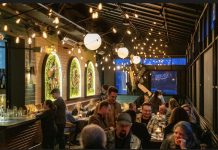
More than 10 years ago, Jason, my husband at the time, and I packed up our Toronto apartment to open a restaurant in a space we bought at 1266 Michigan Ave. in Corktown.
We lived in the restaurant and slept on a futon mattress on the tables while we renovated and looked for an apartment. When we opened, Brooklyn Street Local was unpolished and very DIY, but people welcomed us to the neighborhood.
When Jason and I decided to separate in 2018, the question arose: What happens to our professional partnership? I wanted to carry on the business; Jason decided to step away. In January 2020, I had a great team and was feeling excited about our potential.
When the first coronavirus shutdown was announced, I believed it was going to be short term. Once the reality of the situation set in, I did a variety of things to stay afloat: selling items through Eastern Market and Metro Detroit Crunchy Co-op in Berkley, partnering with the Corktown Business Association and Ford Motor Co. to prepare meals for health care workers, setting up at Fisheye Farms’ weekly farm stand.
I was so proud to be part of such a supportive and creative community, but I had to find a way to reopen, which I did in April 2021.
But the challenges and the stress that came with them took a toll. After nine and a half years, I couldn’t do it anymore. I was burnt out. There is a reason so many people have left the industry: It is such hard work to do long term — it takes so much out of a person, both mentally and physically.
I would get so stressed seeing things forgotten or not done the way I wanted. Nineteen things could go wrong in a day and then the 20th thing, even if it was small, would be my breaking point. I was reaching this breaking point more and more often.
A year ago this month, I made the tough decision to close Brooklyn Street Local. At the time, I said it wasn’t goodbye. I wanted to continue to do things in the space — I just needed to find a way to make it sustainable for my mental health.
A person really has to love the hospitality industry to stay in it. I do love it. I love working with local farmers and local vendors. I love the energy, the fast pace, the excitement. I love serving people good food, and I love our customers, regulars, and staff, who make up the BSL family, and the community we are a part of.
In the past year, I’ve realized that Brooklyn Street Local is where my heart is. After working together on events and pop-ups, Jason and I decided to reopen the restaurant together, but it’s going to look a little different. It will still be a community gathering place, but it will be simplified so that it’s easier to manage the day- to-day. We are going to have a smaller menu with counter service instead of table service and be open five days a week instead of six.
Previously, I felt like I couldn’t change things too much because I didn’t want to disappoint people. I have shifted my perspective and know that I want to prioritize a healthy work-life balance by not taking on more than feels comfortable.
After the past two years of uncertainty, it feels good to have clear goals for the restaurant. But business owners need help going forward. Customers need to understand that things have shifted.
We are trying our best to keep up a high level of service, but that is impossible when we’re short-staffed and we have not had a break and the cumulative stress of the past years is taking its toll. These are the things that customers don’t see, but then they wonder why their food is taking a long time or why their water glass hasn’t been filled and then they leave a bad review. I have talked to so many small-business owners in the past year who have been in tears, not knowing what to do, wondering if they will have to close.
One of the reasons we are able to reopen is we had the security of owning the BSL property. This is vitally important. If people want to help local, independent businesses survive, they can support organizations like the Detroit Black Farmer Land Fund, which helps farmers secure the land they cultivate. While we are figuring out new ways of doing things, we need to be kind to each other, and we need to be patient, and we need to be supportive.
This story is from the from the October 2022 issue of Hour Detroit magazine. Read more in our digital edition.
|
|
|









